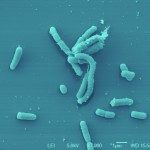Lien vers Pubmed [PMID] – 20728914
Virology 2010 Nov;407(1):43-52
YpfΦ is a filamentous phage that infected Yersinia pestis, the plague bacillus, during its emergence. Using an experimental transduction approach, we show here that this phage has the capacity to infect with variable efficiencies, all three pathogenic Yersinia species as well as Escherichia coli. Like other Inovirus phages, its genetic organization comprises three functional modules necessary for the production of infectious virions. Upon infection, YpfΦ integrates into the chromosomal dif site, but extrachromosomal forms are also frequently observed. Several pieces of evidence suggest that the absence of chromosomal YpfΦ in natural non-Orientalis Y. pestis isolates results from a higher chromosomal excision rate rather than from a defective integration machinery. A resident YpfΦ confers some protection against a superinfection. In contrast to other filamentous phages, the incoming YpfΦ genome inserts itself between two copies of the resident prophage. This analysis thus unravels infective properties specific to YpfΦ.

